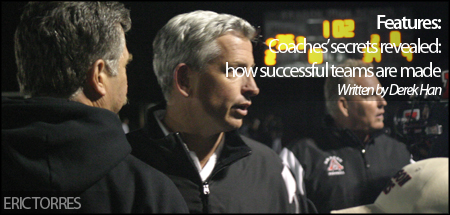
Coaching is a skill. It’s a skill that helps young athletes become stronger at their game and as individuals.
Some athletes prefer an intense coach who shouts while others want a calm coach. So naturally, different coaching styles have their own benefits.
“I try to adapt to athletes. I always try to get feedback in terms of how they feel,” says Asif Rahman, future track and field coach and science teacher.
Because of the individuality in track and field, Rahman coaches what is desirable to different athletes. “Some athletes want me to shout, others don’t,” he says.
Respect is another important aspect in coaching. Girls’ soccer coach Will Colglazier says, “I don’t want to be the coach that [players] don’t want. I want it to be fun.”
“He’s very supportive and he understands that soccer isn’t the only thing going on,” says sophomore Ashley Lentz.
“I try to focus on one thing during each practice. Just the other day we focused just on heading,” says Colglazier.
“He’s very motivated in getting through what we need to get done,” says senior team captain Kathryn McAuliffe.
As team captain, McAuliffe seeks guidance from Colglazier to lead the team.
“He helps enforce what we say,” says McAuliffe.
“I look for a coach who I respect and want to play for. I play harder for coaches I want to play for. I want a coach that I respect and respects me,” says Colglazier.
Colglazier’s coaching style has led to a CCS win for the varsity girl’s soccer team this past March and the team is looking for another this upcoming season.
“[My coaching style] changes every year, this year it’s more strict…we stick to discipline, routine, and we work hard. Having a routine is easier,” says wrestling coach Steve Ratto.
Due to the increased participation in wrestling this year, Ratto says, “It’s more strict because there are more kids that are interested.”
When it comes times for push-ups, Ratto makes sure every wrestler does every single one of them. Even missing one push-up has serious consequences.
“If somebody skips a push-up, we add more,” says Ratto, “We want to hold them accountable.”
Sophomore Marc Reichenberger says, “He works us really hard in a good way, not in a ‘I don’t wanna be here way.’ ”
Athletic director Steve Sell takes positivity and applies it to coaching. “I’m expressive. I give direct and immediate unfiltered feedback,” he says. “I like to catch kids doing stuff right. That’s the most enjoyable part about coaching.”
Not only is Sell positive on the field, but off the field, he applies his positivity to academics.
“He always has you get your work done so you can stay eligible. He sometimes has study sessions, and when you’re ineligible he can help you out,” says junior Zack Neves.
Along with positivity is Sell’s calm and encouraging style. “He doesn’t really yell, he tells you what to do and tells you, ‘you can do it,’” says Neves.
Sophomore James Garcia adds, “He gives positive feedback on our games and encourages us to work hard at practices.”
Some coaches will be quiet and use their calm but firm communication to help motivate a player. Some coaches will be loud, strict and treat the team as if they were navy seals. And then there are some coaches who combine these different methods.
There are coaches who will stick to a fixed schedule and go over every aspect of the sport. Other coaches may just work on one aspect of the sport during practice. And there are coaches who have unique routines for every practice.
Different coaches have different ways of running their team to help them develop winning attitudes, sportsmanship, and unity.
At the end of the day, despite winning or losing, a coach finds ways to make their team the best it can be. This is why coaching is such a rewarding experience.




